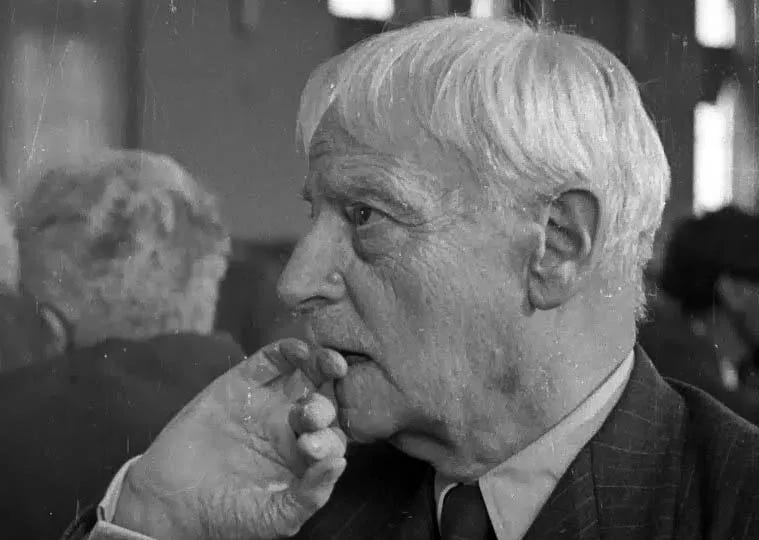The Treason of the Intellectuals and Its Enduring Relevance
Julien Benda’s Critique
Julien Benda’s 1927 work, The Treason of the Intellectuals (La Trahison des clercs), is a seminal critique that addresses the perceived failure of modern intellectuals to uphold objective truth in favor of political engagement and nationalism. Emerging in the aftermath of World War I, Benda’s analysis reflects a broader philosophical discourse on the moral responsibilities of intellectuals during a time of significant social upheaval in Europe.
Julien Benda’s 1927 work, The Treason of the Intellectuals (La Trahison des clercs), is a seminal critique that addresses the perceived failure of modern intellectuals to uphold objective truth in favor of political engagement and nationalism. Emerging in the aftermath of World War I, Benda’s analysis reflects a broader philosophical discourse on the moral responsibilities of intellectuals during a time of significant social upheaval in Europe.
He argued that many intellectuals had abandoned their historic role as guardians of universal ideals, instead aligning themselves with the partisan interests of their nations or social classes, thereby betraying their vocation and contributing to societal divisiveness and moral decline.
The function of the intellectual is not to be a beautiful soul, but to be a critical consciousness.
Edward Said
Benda’s critique sparked considerable debate about the nature of intellectual engagement in politics, highlighting a troubling trend where the pursuit of universal truths was supplanted by adherence to specific ideologies. This shift not only diminished the moral authority of intellectuals but also raised questions about their capacity to act as objective seekers of truth amidst growing nationalistic sentiments.
His insights resonate in contemporary discussions, particularly as modern intellectuals navigate the challenges posed by political polarization and the influence of social media, prompting scholars to reexamine the balance between political responsibility and the pursuit of truth.
Background
Julien Benda’s critique, particularly encapsulated in his work from 1927, emerges from a tumultuous period marked by significant social and political upheaval in Europe following World War I. During this time, Benda observed a profound shift in the role of intellectuals, who historically were seen as purveyors of universal truths and moral ideals. He posited that the intellectuals had begun to betray their vocation by succumbing to nationalistic fervor and political partisanship, prioritizing material and transient ideals over the pursuit of universal humanism.
Benda’s analysis was not merely a contemporary reflection; it was deeply rooted in a broader philosophical discourse that questioned the moral responsibilities of intellectuals. He criticized the trend whereby intellectuals, instead of advocating for transcendent ideals, aligned themselves with the particular interests of nations or social classes, effectively becoming advocates for political movements rather than objective truth. This shift, he argued, led to the “treason” of the intelligentsia, as they neglected their role as disinterested seekers of truth and instead engaged in political hatreds and tribalism.
Patriotism is the last refuge of a scoundrel.
Samuel Johnson
The intellectual climate of the 1920s, characterized by the rise of various nationalist movements and the burgeoning of modernist thought, created fertile ground for Benda’s criticisms. He identified a growing danger where intellectuals, who once sought to enlighten society, were now contributors to its divisiveness and moral decline. Through his work, Benda articulated a poignant warning against the intellectual abdication of responsibility in an era that increasingly celebrated particularism over universal values. This critique not only resonated with the intellectual debates of his time but continues to evoke discussion about the role of intellectuals in contemporary society.
Analysis of the Critique
Julien Benda’s seminal work, The Treason of the Intellectuals, published in 1927, presents a powerful indictment of contemporary intellectuals for their perceived betrayal of disinterested ideals in favor of political engagement and social trends. Benda argues that many thinkers and artists have abandoned their duty to uphold objective truth, instead prioritizing political expediency over intellectual integrity. This critique resonates with the notion that intellectuals should serve as moral compasses for society, raising expectations that they often fail to meet, leading to widespread public disappointment and accusations of betrayal.
Benda’s argument is framed within the context of a historical decline in the autonomy of intellectuals, who have become increasingly dependent on political and religious powers. He contends that this dependency compromises their ability to remain disinterested and idealistic, as they become enmeshed in the practicalities of political life. Benda laments the shift in focus from universal truths to particularistic values driven by national or class interests, suggesting that this shift represents a fundamental betrayal of culture and the intellectual vocation itself.
The critique has garnered renewed interest in contemporary discussions, particularly in light of the current climate of political polarization and the challenges faced by intellectuals today. Scholars argue that Benda’s insights remain relevant as modern intellectuals grapple with the balance between political engagement and the pursuit of truth, navigating the complexities of their roles in society. This enduring relevance underscores the importance of Benda’s critique in understanding the responsibilities of intellectuals and the implications of their choices on cultural discourse.
Reception
Julien Benda’s 1927 work, The Betrayal of Intellectuals, received significant attention for its incisive critique of modern intellectuals who, according to Benda, have forsaken universal values in favor of political engagement. His arguments resonate with contemporary discussions regarding the role of intellectuals in society, particularly in an age characterized by political polarization and the influence of social media. Benda’s contention that many intellectuals sacrifice their objectivity for political gains remains relevant today, as evidenced by the behaviors of various prominent intellectuals like Noam Chomsky and Thomas Piketty, whose political affiliations often shape their academic contributions.




